Module 3 Unit 3 Sea water and rain water 教案 (牛津上海版七年级上册) (4)
七年级英语Sea water and rain water教案

二、教学重难点
1、重点
掌握重点词汇,如“sea water” “rain water” “salty” “fresh”等。
理解并能够运用描述海水和雨水的句子,如“Sea water is salty” “Rain water is fresh”
2、难点
能够清晰地阐述海水和雨水的区别,并在实际情境中正确运用相关表达。
七年级英语Sea water and rain water教案
一、教学目标
1、ቤተ መጻሕፍቲ ባይዱ生能够理解并正确运用与海水(sea water)和雨水(rain water)相关的词汇和表达。
2、学生能够描述海水和雨水的特点及区别。
3、培养学生的阅读和听力理解能力,能够从相关文本和听力材料中获取关键信息。
4、引导学生关注水资源的重要性,并培养节约用水的意识。
呈现与海水和雨水相关的词汇,如“sea water” “rain water” “salty” “fresh” “evaporation” “condensation”等。
通过图片、实物或动作等方式帮助学生理解这些词汇的含义。
进行词汇的认读和拼写练习,让学生熟练掌握这些词汇。
3、句型学习(Sentence pattern learning)
强调水资源保护的重要性,鼓励学生在日常生活中节约用水。
8、作业布置(Homework)
让学生回家后查阅资料,了解更多关于水资源的知识,并制作一张手抄报。
背诵本节课所学的重点词汇和句型。
五、教学反思
在教学过程中,要充分关注学生的学习情况和反应,及时调整教学方法和节奏。通过多种教学活动的设计,激发学生的学习兴趣和积极性,提高学生的语言综合运用能力。同时,要加强对学生的引导和启发,培养学生的自主学习能力和创新思维。在今后的教学中,还可以进一步拓展教学内容,增加与实际生活紧密联系的案例,让学生更好地将所学知识运用到实际中。
七年级英语:Module 3 Unit 3 Sea water and rain water Period 1教案上海牛津版
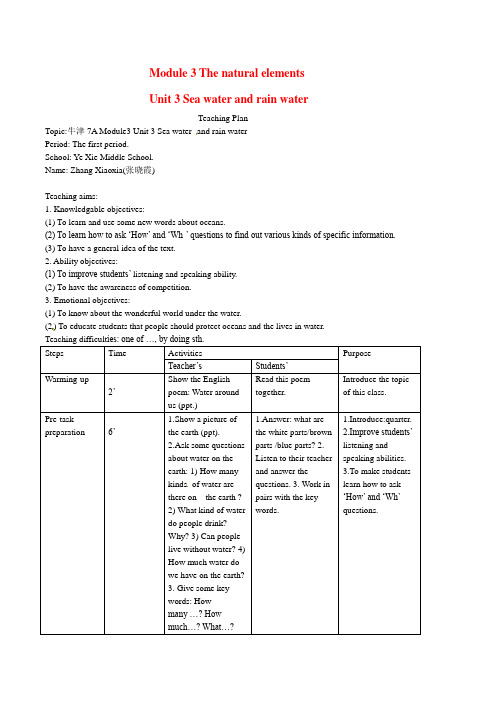
Module 3 The natural elementsUnit 3 Sea water and rain waterTeaching PlanTopic:牛津7A Module3 Unit 3 Sea water and rain waterPeriod: The first period.School: Ye Xie Middle School.Name: Zhang Xiaoxia(张晓霞)Teaching aims:1. Knowledgable objectives:(1) To learn and use some new words about oceans.(2) To learn how to ask ‘How’ and ‘Wh-’ questions to find out various kinds of specific information.(3) To have a general idea of the text.2. Ability objectives:(1) To improve students’ listening and speaking ability.(2) To have the awareness of competition.3. Emotional objectives:(1) To know about the wonderful world under the water.(2) To educate students that people should protect oceans and the lives in water.Steps Time Activities PurposeTeacher’s Students’Warming-up2’Show the Englishpoem: Water aroundus (ppt.)Read this poemtogether.Introduce the topicof this class.Pre-task preparation 6’1.Show a picture ofthe earth (ppt).2.Ask some questionsabout water on theearth: 1) How manykinds of water arethere on the earth ?2) What kind of waterdo people drink?Why? 3) Can peoplelive without water? 4)How much water dowe have on the earth?3. Give some keywords: Howmany …? Howmuch…? What…?1.Answer: what arethe white parts/brownparts /blue parts? 2.Listen to their teacherand answer thequestions. 3. Work inpairs with the keywords.1.Introduce:quarter.2.Improve students’listening andspeaking abilities.3.To make studentslearn how to ask‘How’ and ‘Wh’questions.While-task activities2’ 1.Ask questions: 1)What lives on land?2) What lives underthe water? 2. Tellstudents with a slide:It is a wonderfulworld under thewater.Answer teac her’squestions.Arouse stu dents’interest in learningthis text.7’1.Show some picturesof sea animals andplants.(ppt.)2.Give the dialoguepattern: Have youever seen…? Yes, Ihave./No, Ihaven’t.(Not yet.)1.Learn some newwords.2.Work in pairs andmake a dialogue.1. To make studentslearn and speak outthe names of seaanimals and plantseasily. 2. To showthe paragraph 3 ofthis text.6’1.Introduce threekinds of main seaanimals: wha les,dolphins and sharks.2. Explain thediff iculty: one of….1. Read the paragraph2 of the text.2. Make sentenceswith the phrase: oneof…Introduce teachingdifficulty: one of…5’1. Give somequestions: 1) Whatcan the oceans giveus? 2)How can peopleget drinking waterfrom sea water? 3)Are the oceansimportant to allanimals? Why? (ppt.)1. First readteacher’s ques tionsthen read theparagraph4 andanswer the questions.1. Improve students’reading ability. 2. Toeducate students tolove all kind of theocean lives. 3.Introdue: bydoing….Post-taskactivity12’Introduce the rules ofthe class competition:The oceans.Answer the questionsand discuss the topicsin groups.1.To make studentshave the awarenessof competition. 2.To educate studentsto protect oceansand the lives inwater.Recite the new words of this text. Read the text at least three time s.Students’ activityCompetition about oceansI. Ask students to get more information from computer before class.II. Divide the whole class into five groups.III.Give them ten questions.Questions:How much of the Earth is water?How many oceans are there in the world?What are they?Which is the largest ocean of the four ?Which is the smallest ?What is the largest animal, both on land and in the oceans?Name two intelligent animals on the earth.Name three beautiful things in the oceans.What can we get from the oceans?How can people get drinking water from the oceans?Topics :How can we protect the earth?How can we protect the oceans?How can we save water?The importance of the oceans.The importance of sea animals and plants.Sea water and rain water 教学设计说明本教案是7A M3The natural elementsU3Sea water and rain water 的第一课时. 在学习本课之前我们已经学习了其他两种自然元素火和风,所以在对两者稍加复习的基础上很自然地引出我们今天要学习的第三种自然元素——水。
【教育资料】六年级下英语教案-Module 3 Unit 2 Sea water and rain water_牛津版(上海)学习专用
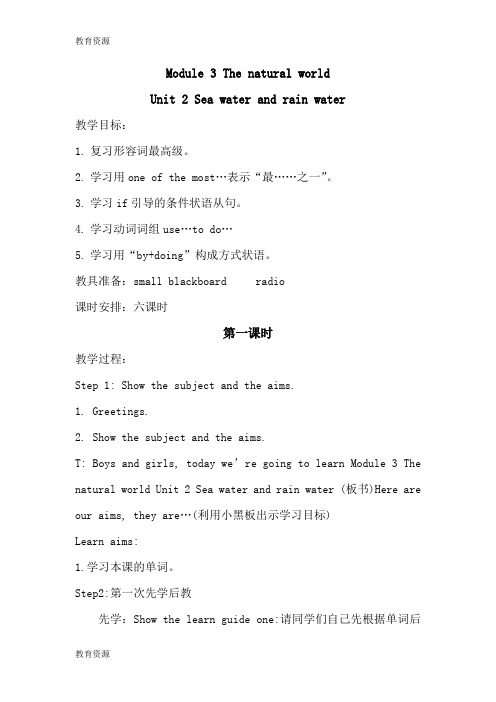
Module 3 The natural worldUnit 2 Sea water and rain water教学目标:1.复习形容词最高级。
2.学习用one of the most…表示“最……之一”。
3.学习if引导的条件状语从句。
4.学习动词词组use…to do…5.学习用“by+doing”构成方式状语。
教具准备:small blackboard radio课时安排:六课时第一课时教学过程:Step 1: Show the subject and the aims.1. Greetings.2. Show the subject and the aims.T: Boys and girls, today we’re going to learn Module 3 The natural world Unit 2 Sea water and rain water (板书)Here are our aims, they are…(利用小黑板出示学习目标)Learn aims:1.学习本课的单词。
Step2:第一次先学后教先学:Show the learn guide one:请同学们自己先根据单词后面的音标进行拼读单词。
I will give you about five minutes,then we’ll check up.后教:1、指名学生自己读单词,先让其他同学帮助解决,必要时教师再作指导。
2、师领读单词。
3、学生边拼边读单词。
4、English and Chinese.Step3:第二次先学后教先学:Show the learn guide two:请同学们边拼读边记忆单词。
I will give you about eight minutes,then we’ll check up.后教:1.English and Chinese,Chinese and English.2.指名学生提问指名学生回答。
M3U3 sea water and rain water
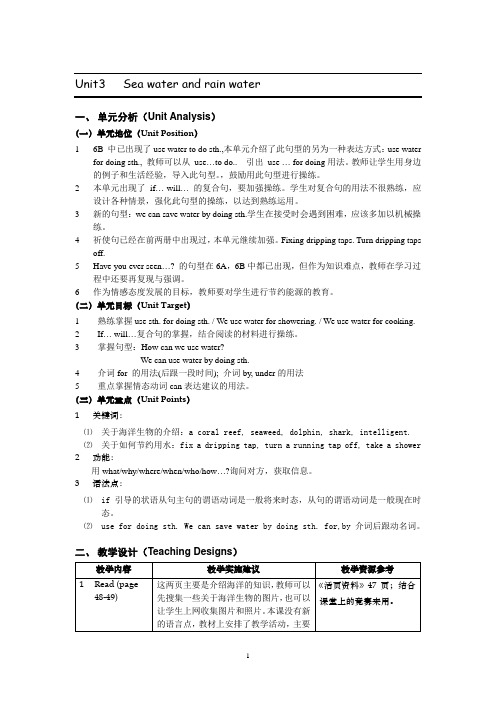
Unit3 Sea water and rain water一、单元分析(Unit Analysis)(一)单元地位(Unit Position)16B 中已出现了use water to do sth.,本单元介绍了此句型的另为一种表达方式:use water for doing sth., 教师可以从use…to do.. 引出use … for doing用法。
教师让学生用身边的例子和生活经验,导入此句型。
,鼓励用此句型进行操练。
2本单元出现了if… will…的复合句,要加强操练。
学生对复合句的用法不很熟练,应设计各种情景,强化此句型的操练,以达到熟练运用。
3新的句型:we can save water by doing sth.学生在接受时会遇到困难,应该多加以机械操练。
4祈使句已经在前两册中出现过,本单元继续加强。
Fixing dripping taps. Turn dripping taps off.5Have you ever seen…? 的句型在6A,6B中都已出现,但作为知识难点,教师在学习过程中还要再复现与强调。
6作为情感态度发展的目标,教师要对学生进行节约能源的教育。
(二)单元目标(Unit Target)1熟练掌握use sth. for doing sth. / We use water for showering. / We use water for cooking. 2If… will…复合句的掌握,结合阅读的材料进行操练。
3掌握句型:How can we use water?We can use water by doing sth.4介词for 的用法(后跟一段时间); 介词by, under的用法5重点掌握情态动词can表达建议的用法。
(三)单元重点(Unit Points)1 关键词:⑴关于海洋生物的介绍:a coral reef, seaweed, dolphin, shark, intelligent.⑵关于如何节约用水:fix a dripping tap, turn a running tap off, take a shower2 功能:用what/why/where/when/who/how…?询问对方,获取信息。
Module 3 The natural elementsUnit 3 Sea water and rain water
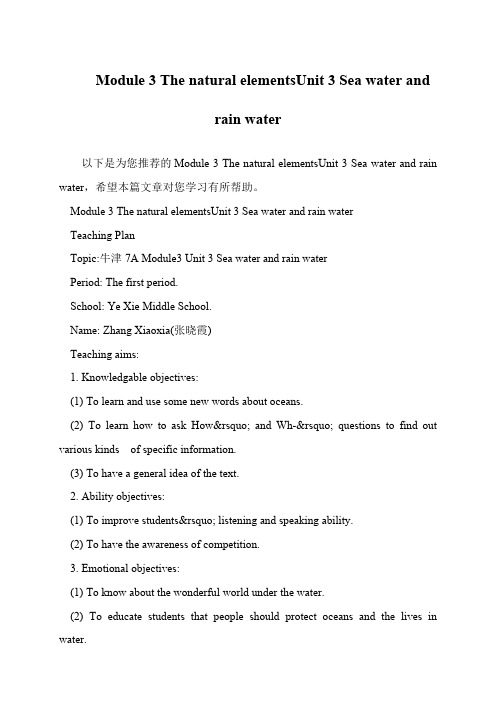
water do people drink? Why? 3) Can people live without water? 4) How much water much? Listen to do we have on the earth? 3. Give some key words: How many ? How What?1.Answer: what are the white parts/brown parts /blue parts? 2. their teacher and answer the questions. 3. Work in pairs with the key
students with a slide: It is a wonderful world under the water.Answer teacher’s questions.Arouse students’ interest in learning this text. 7’1.Show some pictures of sea animals and plants.(ppt.) 2.Give the dialogue pattern: Have you ever seen? Yes, I have./No, I haven’t.(Not yet.)1.Learn some new words.
2.Work in pairs and make a dialogue. 1. To make students learn and speak out the names of sea animals and plants easily. 2. To show the paragraph 3 of this text. 6’1.Introduce three hins and sharks. 2. Explain the difficulty: one of.1. Read the paragraph 2 of the text.
Unit 3Sea water and rain water课文详解
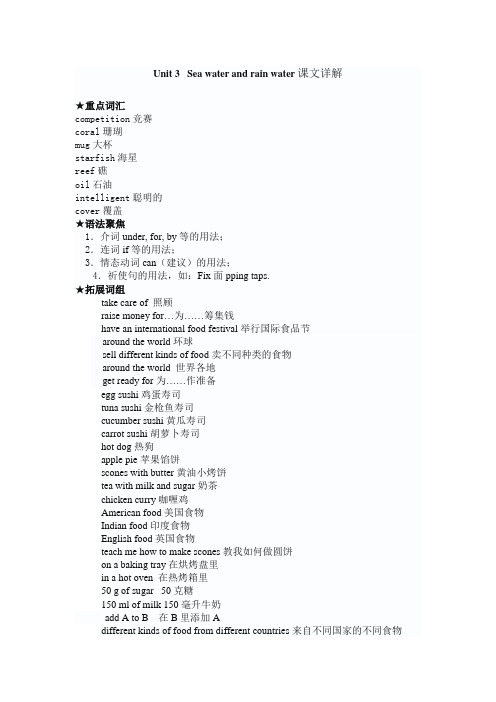
Unit 3 Sea water and rain water课文详解★重点词汇competition竞赛coral珊瑚mug大杯starfish海星reef礁oil石油intelligent聪明的cover覆盖★语法聚焦1.介词under, for, by等的用法;2.连词if等的用法;3.情态动词can(建议)的用法;4.祈使句的用法,如:Fix面pping taps.★拓展词组take care of 照顾raise m oney for…为……筹集钱have an international food festival 举行国际食品节around the world 环球sell different kinds of food 卖不同种类的食物around the world 世界各地get ready for 为……作准备egg sushi鸡蛋寿司tuna sushi金枪鱼寿司cucumber sushi 黄瓜寿司carrot sushi 胡萝卜寿司hot dog 热狗apple pie 苹果馅饼scones with butter 黄油小烤饼tea with milk and sugar奶茶chicken curry 咖喱鸡American food美国食物Indian food 印度食物English food 英国食物teach me how to make scones 教我如何做圆饼on a baking tray 在烘烤盘里in a hot oven 在热烤箱里50 g of sugar 50克糖150 ml of milk 150毫升牛奶add A to B 在B里添加Adifferent kinds of food from different countries来自不同国家的不同食物nine yuan and twenty (¥9.20) 九元二角★拓展词汇litre 升milliliter 毫升milligram 毫克millimeter 毫米centimeter 厘米kilometer 千米Milky Way galaxy 银河系orbit 轨道revolution公转rotation自转secondary planet卫星comet彗星meteorite陨石star shower流星雨The Zodiac黄道十二宫:Sries白羊座( 03.21-04.19)Taurus金牛座(04.20-05.20)Gemini双子座(05.21-06.21)Cancer巨蟹座(06.22-07.22)Leo狮子座(07.23-08.22)Virgo处女座(08.23-09.22)Libra天秤座(09.23-10.22)Scorpio天蝎座(10.23-11.22)Sagittarius人马座(11.23-12.21)Capricorn摩羯座(12.22-01.19)Aquarius水瓶座(01.20-02.19)Pisces双鱼座(02.20-03.20)★课文英汉对照Water in the oceans海洋中的水People and a lot of animals live on land.However, only a quarter of the earth is land.人类和许多动物生活在陆地上。
六年级下英语教案-Module 3 Unit 2 Sea water and rain water_牛津版(上海)-精选教学文档
Module 3 The natural worldUnit 2 Sea water and rain water教学目标:1.复习形容词最高级。
2.学习用one of the most…表示“最……之一”。
3.学习if引导的条件状语从句。
4.学习动词词组use…to do…5.学习用“by+doing”构成方式状语。
教具准备:small blackboard radio课时安排:六课时第一课时教学过程:Step 1: Show the subject and the aims.1. Greetings.2. Show the subject and the aims.T: Boys and girls, today we’re going to learn Module 3 The natural world Unit 2 Sea water and rain water (板书)Here are our aims, they are…(利用小黑板出示学习目标)Learn aims:1.学习本课的单词。
Step2:第一次先学后教先学:Show the learn guide one:请同学们自己先根据单词后面的音标进行拼读单词。
I will give you about five minutes,then we’ll check up.后教:1、指名学生自己读单词,先让其他同学帮助解决,必要时教师再作指导。
2、师领读单词。
3、学生边拼边读单词。
4、English and Chinese.Step3:第二次先学后教先学:Show the learn guide two:请同学们边拼读边记忆单词。
I will give you about eight minutes,then we’ll check up.后教:1.English and Chinese,Chinese and English.2.指名学生提问指名学生回答。
牛津上海版英语七年级上册《unit 3 sea water and rain water》优秀教案3篇(重点资料).doc
Module 3 The natural elementsUnit 3 Sea water and rain waterTopic Oxford English For Grade Seven--- “Sea water and rain water ”Period The third periodName ChenranI. Teaching aims1. Knowledge objectivesVocabulary build-up a dripping tap , a running tap , a s hower , fix , mugSentence patterns How can we save water ?We can save water by ____ing…[来网]We can save water by not ____ing …Introduction of different ways of saving water2. Ability objectivesTo develop the students’munication skills by learning useful structures and vocabulary.To improve the students’petence of working in pairs and groups.3. Emotion objectives]To enable the students to understand that water is important for us.To tell students how to save water in daily lim]II. Teaching methodsTask-based teaching methodSituational language teachingMulti-media methodmunicative language teachingIII. Studying methodEncou rage the students to study language through “observation----Imitation---Practice ”.IV. Teaching ProcedurePre-task preparation1. A petition to review the uses of waterDivide Ss into six groups . Ss take turns to say how to use water by using the sentence pattern We use water for ___ing. To see which group say the most.Ss think about the question Do you waste water when you use it?While-task procedure1. Introduce new words.Ss listen to three different sounds and guess where it is from.Then introduce new words by pictures a dripping tap , a running tap , a shower2. Show Ss some pictures of people wasting water.Picture One What is the boy doing ? ( He is brushing his teethHe is brushing his teeth under a running tap.What should we say to him? ( Don’t brush your teeth under a running tap.)Picture Two What is the woman doing ? ( She is washing dishes and vegetables under a running tap.)What should we say to her ? ( Don’t wash dishes or vegetables under a running tap. )Picture Three What is this ? ( a dripping tap )What should we do when we see a dripping tap ? ( We should fix it / We should turn the dripping tap off )Picture Four Taking a shower and having a bath , which is a waste of water ?( Having a bath )What should we do ? ( We should take a shower rather than have a bath) Picture Five What is the child doing ? ( He is playing with water )What should we say to him ? ( Don’t waste water for playing games )Ss think about How can we save water ?Introduce We can save water by ___ing…We can save water by not ___ing …Show Ss different pictures. In pairs , Ss talk about how to save water .eg. S1 How can we save water?S2 We can save water by fixing dripping taps.S1 How can we save water?S2 We can save water by not brushing our teeth under a running tap. Encourage Ss to think about more ways to save watereg. We can save water by not washing our face under a running tap.Post-task activity1. Ss make a conclusion Where do people usually waste water ?At home At school In the factory2. In groups , Ss choose a place and make a dialogue or a short play about saving water.3. In groups , Ss make a poster about saving water.Assignment Oral Read and recite the dialogue on P .44Written Write a report about different ways of saving water]教]resources on the internet2. To develop the students' abilities of listening ,readin g, writing and speaking3. To further understand the importance of saving water and arouse their awareness of savingwater and protecting environment4. To cultivate the students' abilities of cooperation and self-study课程标准的有关内容(英语国家课程标准)1.To stimulate and cultivate the students' interests of learning English through curriculumstudy and practice;2.To make the students' have confidence on how to learn English and cultivate ag ood habit tolearn English;3.To have a good mastery of four skills of listening, speaking, reading and writing;4.To cultivate the students' abilities of observation, memory, thinking, imagination andcreation ;5. To help the students to realize the world and tell the differences between the westernculture and the eastern culture and then cultivate the students' patriotism and dosomething for their future development;学习目标1.To hav e a good mastery of language focus1) Asking "How "questions to find out means2) Using connectives to express conditions3) Further understanding of the importance of saving water[2. To learn how to collect some information and resources of the themes of theforming process of sea water and rain water and arouse their awareness of saving water3. To learn how to discuss a certain topic in English and cultivate their abilities ofcooperation能力训练1. To train the students' abilities of how to collect the relevant information and resources o]the internet2. To train the students' four skills of listening, speaking, reading and writing3. To cultivate the students' abilities of cooperation教学策略Let the students find out their relevant resources on the internet by Google;read some reports onlack of water in some cities in China and saving water in some big cities in China and let thestudents further understand the importance of water and how to use water well and arouse theirawareness of protecting environment. Meanwhile ,let them have a good mastery of language focus.网]课程设计1.First,read index of contents about sea water and rain water2.Secondly, let students read some reports on lack of the resources of water in some cities inChina by Google and have a short discussion in groups of three or four and make some conclusion.3.Thirdly,read some reports on saving water in some cities in China by Google nd have a shortdiscussion in groups of three or four and make some conclusion.4.Then , watch some pictures of sea water without any pollut ion by Google5.Finaly, let the students have a warm discussion about the topic of sea water and rain water.Module 3 The natural elementsUnit 3 Sea water and rain waterTeaching PlanTopic牛津7A Module3 Unit 3 Sea water and rain waterPeriod The first period.School Ye Xie Middle School.Name Zhang Xiaoxia(张晓霞)Teaching aims [1. Knowledgable objectives(1) To learn and use some new words about oceans.(2) To learn how to ask ‘How’and ‘Wh-’questions to find out various kinds of specific information.(3) To have a general idea of the text.2. Ability objectives(1) To improve students’listening and speaking ability.(2) To have the awareness of petition.3. Emotional objectives(1) To know about the wonderful world under the water.(2) To educate students that people should protect oceans and the lives in water. Teaching difficulties one of …, by doing sth1) How many kindsArouse studentsshow t.(Not yet.)animals whales,1. Give some 1. Firsts questionsandpetition. 2. ToRecite the new words of this text.Read the text at least three time s.Students’activitypetition about oceansI. Ask students to get more information from puter before class.II. Divide the whole class into five groups.III.Give them ten questions.QuestionsHow much of the Earth is water?How many oceans are there in the world?What are they?Which is the largest ocean of the four ?Which is the smallest ?What is the largest animal, both on land and in the oceans?Name two intelligent animals on the earth.Name three beautiful things in the oceans.What can we get from the oceans?How can people get drinking water from the oceans?TopicsHow can we protect the earth?How can we protect the oceans?How can we save water?The importance of the oceans.The importance of sea animals and plants.Sea water and rain water 教学设计说明本教案是7A M3The natural elementsU3Sea water and rain water 的第一课时. 在学习本课之前我们已经学习了其他两种自然元素火和风,所以在对两者稍加复习的基础上很自然地引出我们今天要学习的第三种自然元素——水。
英语Module 3 Unit 3 Sea water and rain water教案(上海牛津七年级上)
Module 3 The natural elementsUnit 3 Sea water and rain water适用年级:初中七年级所属学科:牛津英语教师姓名:袁鹰单位名称:上海市顾路中学课程名称﹕Oxford English 7A,Module 3 Unit 3 (Sea water and rain water)学科领域:English, Science年级水平:Grade seven of junior high school目的:1.To provide the students' opportunities on how to collect the relevant information andresources on the internet2. To develop the students' abilities of listening ,readin g, writing and speaking3. To further understand the importance of saving water and arouse their awareness of savingwater and protecting environment4. To cultivate the students' abilities of cooperation and self-study课程标准的有关内容(英语国家课程标准)1.To stimulate and cultivate the students' interests of learning English through curriculumstudy and practice;2.To make the students' have confidence on how to learn English an d cultivate a g ood habit tolearn English;3.To have a good mastery of four skills of listening, speaking, reading and writing;4.To cultivate the students' abilities of observation, memory, thinking, imagination andcreation ;5. To help the students to realize the world and tell the differences between the westernculture and the eastern culture and then cultivate the students' patriotism and dosomething for their future development;学习目标1.To hav e a good mastery of language foc us:1) Asking "How "questions to find out means2) Using connectives to express conditions3) Further understanding of the importance of saving water2. To learn how to collect some information and resources of the themes of theforming process of sea water and rain water and arouse their awareness of savingwater3. To learn how to discuss a certain topic in English and cultivate their abilities ofcooperation能力训练1. To train the students' abilities of how to collect the relevant information and resources onthe internet2. To train the students' four skills of listening, speaking, reading and writing3. To cultivate the students' abilities of cooperation教学策略Let the students find out their relevant resources on the internet by Google;read some reports on lack of water in some cities in China and saving water in some big cities in China and let the students fur ther understand the importance of water and how to use water well and arouse their awareness of protecting environment. Meanwhile ,let them have a good mastery of language focus.课程设计1.First,read index of contents about sea water and rain water2.Secondly, let students read some reports on lack of the resources of water in some cities inChina by Google and have a short discussion in groups of three or four and make some conclusion.3.Thirdly,read some repor ts on saving water in some cities in China by Google nd have a short discussion in groups of three or four and make some conclusion.4.Then , watch some pictures of sea water without any pollut ion by Google5.Finaly, let the stu dents have a warm discussion about the topic of sea water and rain water.。
M3U3 Sea water and rain water(P50-53)
M3U3 Sea water and rain water (P50-53)1.某人发生某事sth. happen to sb.2.碰巧做某事(两种)happen to do sth. / do sth. by chance3.没有水只能生存大约三天only live for about three days without water 4.没有水刷牙have no water to brush our teeth / no=not any 5.冲淋浴(三种)have a shower, take a shower, shower6.洗碗碟和蔬菜wash dishes and vegetables7.没有东西吃(两种)have nothing to eat / have not anything to eat 8.没有地方住(两种)have nowhere to live / have not anywhere to live 9.烧饭菜/ 灭火cook food / put out fires10.从图书馆借一本专题书borrow a project book from the library11.从某人借……(两种)borrow sth. from sb. / borrow sb. sth. 12.把……借给某人(两种)lend sth. to sb. / lend sb. sth.13.在美术课上画一幅画paint a picture in an art lesson14.饭店里的厨师cooks in restaurants15.水的用途/ 使用……the uses of water / make use of sth.16.修理一个滴水的水龙头fix a dripping tap17.关掉一个流水的水龙头(两种)turn a running tap off / turn off a running tap 18.宁愿洗淋浴而不洗盆浴take / have a shower rather than a bath19.以玩游戏来浪费水waste water for playing games20.考虑节约用水的不同方法think of different ways of saving water21.与某人交谈(两种)talk with sb. / talk to sb.22.通过修理滴水的龙头来节水save water by fixing a dripping tap23.通过不在流水的龙头下刷牙节水save water by not brushing our teeth under a …24.用一个大杯代替在流水的龙头下刷牙use a mug instead of brushing teeth under …25.与某人讨论某事/与某人进行一个讨论discuss sth. with sb. / have a discussion with sb.M3U3 Sea water and rain water (P50-53) (中文) 1.某人发生某事2.碰巧做某事(两种)3.没有水只能生存大约三天4.没有水刷牙5.冲淋浴(三种)6.洗碗碟和蔬菜7.没有东西吃(两种)8.没有地方住(两种)9.烧饭菜/ 灭火10.从图书馆借一本专题书11.从某人借……(两种)12.把……借给某人(两种)13.在美术课上画一幅画14.饭店里的厨师15.水的用途/ 使用……16.修理一个滴水的水龙头17.关掉一个流水的水龙头(两种)18.宁愿洗淋浴而不洗盆浴19.以玩游戏来浪费水20.考虑节约用水的不同方法21.与某人交谈(两种)22.通过修理滴水的龙头来节水23.通过不在流水的龙头下刷牙节水24.用一个大杯代替在流水的龙头下刷牙25.与某人讨论某事/与某人进行一个讨论。
- 1、下载文档前请自行甄别文档内容的完整性,平台不提供额外的编辑、内容补充、找答案等附加服务。
- 2、"仅部分预览"的文档,不可在线预览部分如存在完整性等问题,可反馈申请退款(可完整预览的文档不适用该条件!)。
- 3、如文档侵犯您的权益,请联系客服反馈,我们会尽快为您处理(人工客服工作时间:9:00-18:30)。
Module 3 The Natural Elements
Unit 3 Sea water and rain water
第一课时,先教了一首歌:There’s a hole in the bottom of the sea。
全班唱的笑哈哈,不过也没啥,哪一回教这首歌时学生不快乐的?呵呵。
然后欣赏大海方面的内容,艺术品、书籍、寓言故事,如普希金的“Fisherman
and golden fish”,也有同学能说上一些。
然后是水:纯净水、自来水、饮用水等;随后是水的覆盖面积,借机教了1/4、3/4的表达式;各式各样的生物;教生词……觉得没费事,学生就学会了。
While-task:阅读、讲解、听音、……
Post-taskactivity:
1.Classcompetition(5个问题)
2.Quiz:a.有关Whales、seahorses、seaweed等知识竞赛;3.最后来一个课文内容的cloze,蛮好,把课文兜底扫荡了一遍,温习了一遍。
觉得学生学得还可以,比上一回教的时候效果要好,不光教了语言知识,还学得充实,扩充了很多。
应该是有收获的一节课。
第二课时:今天在课前安排沈诗琪准备讲述The fisherman and the golden fish--- by Russian
poet Pushkin,她还真不错,精心准备,详细叙述,显示了不俗的讲故事能力。
(当然,时态上面是她的一个缺陷,不过还小嘛,以后有的是机会将她改造过来。
)随后:Information about water,Plants and animals need water to grow.We can live one or two weeks if there is no food to eat.
How long can we live if there is no water?
We can only live for about three days without water.
正文:What will happen if there is no water?Atwork/atschool/inthecountryside
转:If there is no sea water, what will happen?又狠狠练了一把条件状语从句,p51填表格对学生来说很简单,use...fordoing...早就会了,所以没费多少事,就搞定。
最后,为了明天的课程埋下伏笔:We use water for doing many things. Without it, we can do nothing and die!Let’s protect water!
第三课时
一上来先复习:If all the icebergs melt, what will happen?居然2班比5班说的积极!看来学
生还得鼓动。
当然,5班的质量更胜一筹。
用课件很快教掉生词、并且练We can save water by not brushing our teeth under a running tap/ by fixing dripping taps.而2班就不行了,板书、试读,都不怎么见效,最后还是老老实实一句句板演,方才奏效。
5班却多出近一刻钟,正好可以来进行我之前准备好的post-taskactivity:Groupwork――6组,Let'ssavewater/money/time/paper/wildanimals/electricity/forests...5个小组均不错,但是第5组不大积极,要督改。
各个小组的内容均不错,说得很动脑筋,准备精心,显示了比较高的水准。
摘取几句,以飨读者。
We can save moneybymakingmoremoney.
Wecansavepaperbywritingsmallerwords.Wecansavetimebydoinglesshomework.Wecansavewildanimalsbynoteatingmeat.Wecansavewaterbynotusingtoomanyswimmingpools.等等,在一个groupwork的小小活动里面,学生既练习了language,又宣扬了环保、保护自然,而且在其中还学会合作。
一举数得,不亦快哉!。
